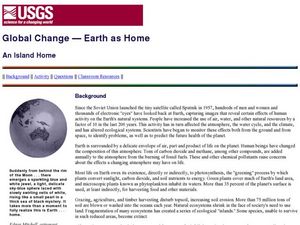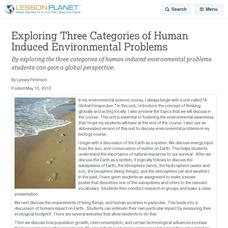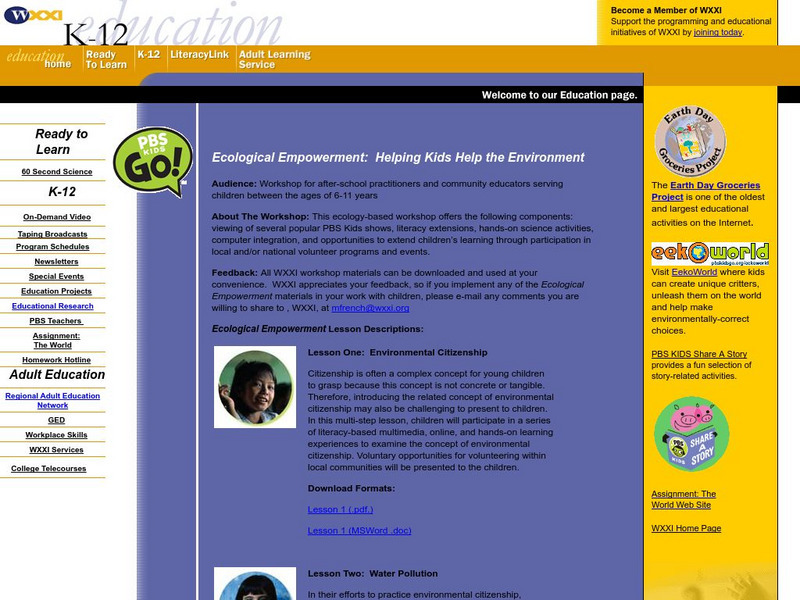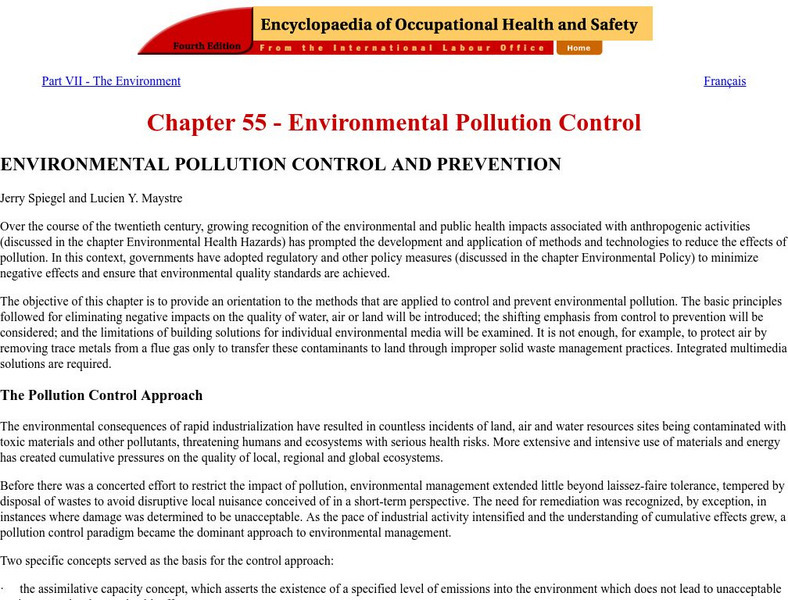Curated OER
Global Change- Earth as Home
Students create their own environment. For this environmental protection lesson, students pretend they are the owners of a tropical island. They create jobs for the citizens and develop the island as a model environment.
Curated OER
Where in the World? Biomes of the Earth
Learners research a biome. In this biomes of the Earth lesson, students discuss what they already know about ecology and view pictures of different biomes. Learners work in groups to research a different biome. Students use the...
Curated OER
Environmental Problems and Solutions
In this environmental problems and solutions worksheet, students are given a list of 25 environmental problems. They match them with a given solution and paste the matching pairs to a piece of construction paper.
Curated OER
"Blow, Wind, Blow" - Wind Power
In this renewable energy worksheet, students learn about wind power. They then answer the 2 questions on the worksheet. The answers are on the last page of the packet.
Curated OER
What Do We Need In Our Environment To Survive?
Students discuss and write about waste management to save the environment. In this environment instructional activity, students discuss what an alien coming to Earth would notice about the environmental needs of humans for survival. They...
Curated OER
Exploring Three Categories of Human Induced Environmental Problems
By exploring the three categories of human-induced environmental problems students can gain a global perspective.
Curated OER
Great River Bend Adventure
Students use their imagination. They discuss the 4 C's of teamwork: Concentration, Communications, Coomperation, and Consideration. Students discuss the safety guidelines of the project. They complete a rope maze. The group walks...
Curated OER
Planning a Healthy City
Ninth graders create a scaled model city. They create a blueprint that provides for the economic and cultural needs of a community. They identify where essential elements of the city should be located and explain the rationale for the...
Curated OER
Environment
Fifth graders receive a general overview of the world's environmental dilemmas thereby understanding the global implications of their actions. They examine their connection to the ecosystem by looking at the influence of the environment...
Curated OER
Oil Spill
Fourth graders watch a video about the types of products made from oil or oil used as energy to produce the product. In groups, they identify the positive and negative aspects of oil and participate in various activities. They use the...
Curated OER
The Rotten Truth
Fourth graders watch a video about how much solid waste is produced by each person and how it is disposed of. Using the internet, they identify and interpret data on the type of trash thrown out the most. They offer possible solutions...
Curated OER
Environmental Jobs
Pupils evaluate whether particular jobs have a positive or negative impact on the environment. In this career exploration lesson, students complete a worksheet in pairs to determine if and why various jobs impact the environment.
Curated OER
A Cleaner Today for a Greener Tomorrow
Pupils examine recycling efforts. In this environmental stewardship lesson, students trace recycling efforts and script a skit regarding incandescent light bulbs' effect on the environment.
Curated OER
Conservation and Environmental Protection
Students brainstorm a list of environments and animals from around the world that need protection. They then design and create a slogan about an animal or environment and an environmental protection poster.
Curated OER
Needs and Wants
Students demonstrate responsible consumer choices. In this social studies lesson, students read The Lorax and discuss wants and needs. Students discuss how to save natural resources by making informed consumer choices.
Curated OER
ESL: Disaster Vocabulary
For this ESL vocabulary worksheet, students read a set of 10 descriptions related to disasters and determine what is being described. Students may click on an answer button for immediate feedback.
Curated OER
A Study of the Effects of Ethanol and Heavy Metal Chemicals on the Development of the Zebrafish Embryo
Students are exposed to the dangers of alcohol abuse through the study and experimentation of alcohol on zebrafish embryos. This exercise can be used to demonstrate the effects of ethanol, cadmium, and lead on embryological development.
Province of British Columbia
Government of b.c.: Teacher's Guide to Clean Air: The Clean Air Crusaders [Pdf]
The 'Clean Air Crusaders' help teachers work with students to educate them about all kinds of air pollution and ways to improve our environment.
NOAA
Noaa: National Ocean Service Education: Nonpoint Source Pollution
Illustrated tutorial explains nonpoint source pollution and its role in the health of the environment. Students learn about different sources of pollution and how these pollutants contaminate the land, air, and water. Click on the links...
Province of British Columbia
Province of British Columbia: How We Measure Air Quality
Find out how British Columbia measures air quality, collects and measures data, and analyzes and reports the findings.
HotChalk
Hot Chalk: Lesson Plans Page: Causes of Pollution
This lesson plan is designed to teach young children identify the types of pollution, the sources of the pollution, and how they can protect the environment from further pollutants.
TeachEngineering
Teach Engineering: Environment
Through 10 lessons and more than 20 hands-on activities, students are introduced to the concept of an environment and the many interactions within it. As they learn about natural and human-made environments, as well as renewable and...
PBS
Pbs Teachers: Helping Kids Help the Environment
Define and explore the concept of environmental citizenship through a series of literacy-based multimedia, online and hands-on learning experiences. Discover how responsible citizens can help protect their local communities by...
Other
Encyclopaedia of Occupational Health and Safety: Environmental Pollution Control
This study provides an orientation to the methods that are applied to control and prevent environmental pollution. The basic principles followed for eliminating negative impacts on the quality of water, air or land are discussed.



















![Government of b.c.: Teacher's Guide to Clean Air: The Clean Air Crusaders [Pdf] Lesson Plan Government of b.c.: Teacher's Guide to Clean Air: The Clean Air Crusaders [Pdf] Lesson Plan](https://d15y2dacu3jp90.cloudfront.net/images/attachment_defaults/resource/large/FPO-knovation.png)



